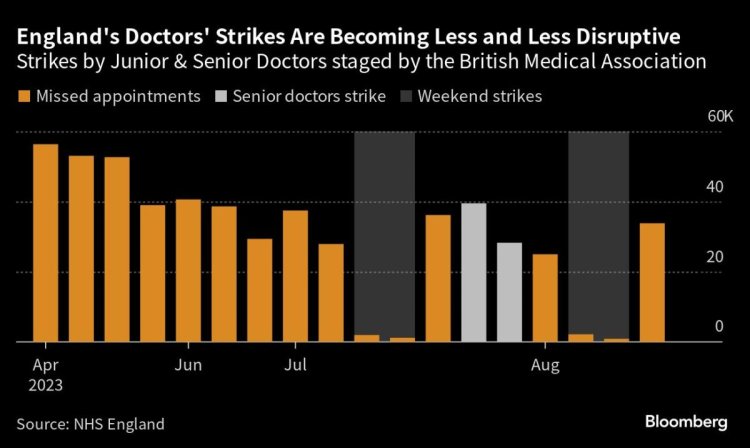UK Strikes Persist as Senior Doctors, Rail Workers Walk Out
1 / 5UK Strikes Persist as Senior Doctors, Rail Workers Walk Out(Bloomberg) -- UK doctors and rail workers are embarking on a fresh round of strikes, continuing months of damaging industrial action that’s hobbled public services and hurt the UK economy.Most Read from BloombergWagner Chief Prigozhin Listed Aboard Crashed Jet, Reports SayHuawei Building Secret Network for Chips, Trade Group WarnsWagner Chief Prigozhin Was in Deadly Jet Crash, Russia SaysWagner Chief Yevgeny Prigozhin, Mercenary Who Defied Putin, Is Presumed DeadQQQ Up in Late Hours on Nvidia’s Bullish Forecast: Markets WrapSenior doctors in England are due to start a two-day walkout at 7 a.m. on Thursday, prolonging a dispute over pay that their union, the British Medical Association, argues has suffered more than a decade of real-terms cuts. Before their action ends, some 20,000 rail workers with the RMT union will strike over pay and conditions, affecting 14 train operators from just after midnight on Saturday morning.

(Bloomberg) -- UK doctors and rail workers are embarking on a fresh round of strikes, continuing months of damaging industrial action that’s hobbled public services and hurt the UK economy.
Most Read from Bloomberg
Wagner Chief Prigozhin Listed Aboard Crashed Jet, Reports Say
Wagner Chief Yevgeny Prigozhin, Mercenary Who Defied Putin, Is Presumed Dead
QQQ Up in Late Hours on Nvidia’s Bullish Forecast: Markets Wrap
Senior doctors in England are due to start a two-day walkout at 7 a.m. on Thursday, prolonging a dispute over pay that their union, the British Medical Association, argues has suffered more than a decade of real-terms cuts. Before their action ends, some 20,000 rail workers with the RMT union will strike over pay and conditions, affecting 14 train operators from just after midnight on Saturday morning.
The twin strikes illustrate the ongoing headache Prime Minister Rishi Sunak faces in trying to draw a line under the UK’s worst period of worker unrest since the late 1980s, while also clamping down on rising prices. Sunak has argued that excessive pay deals will only fuel inflation that at 6.8% is still running at more than three times the official target.
The timing of the rail strike is also particularly disruptive for holidaymakers, coming at the beginning of a bank holiday weekend. It will hamper journeys for festival-goers traveling to Edinburgh, Reading and Leeds, with the Rail Delivery Group — representing train companies — warning that timetables are likely to start later and finish earlier than usual on Saturday.
“In some areas only around half of train services will run, while other parts of the country will have fewer or even no services at all,” the RDG said on its website.
The RMT plans another strike on Sept. 2, with another rail union, Aslef, due to take action a day earlier.
The unions have also accused the government of meddling in negotiations late last year. While a deal was reached with National Rail, who operate the train tracks, the dispute with train companies remains in deadlock, with the unions saying they’ve not had negotiations in months.
Sunak had sought to draw a line under the industrial action with a series of pay awards to public sector workers — including a 6% raise for doctors — in July. That didn’t cover rail workers, whose pay is set by the train operators. Nevertheless, the government has sought to play a facilitative role in those discussions, and the unions argue that their remuneration also relies on government funding for the rail network.
The RMT in February rejected a deal for pay to rise 5% and 4% in successive years.
Industrial action has been damaging for the National Health Service, which has been hit by strikes by junior doctors, their senior colleagues known as consultants, and nurses. Strikes have led to delays for almost 840,000 hospital appointments so far, and NHS Providers, which speaks for health trusts, estimates the walkouts have cost the NHS an estimated £1 billion ($1.3 billion).
The action by senior doctors can be particularly disruptive because their junior colleagues can’t cover for them in the same way that they are able to step in when junior doctors are on strike. They held their first ever England-wide walkout in July, leading to 60,000 appointments being canceled.
In the absence of any further negotiations with the government, the BMA is planning further action in September and three consecutive strike days in October, marking the longest period of industrial action by consultants to date.
That’s a threat to Sunak’s pledge to get NHS waiting lists down, one of five core promises he’s told voters to judge him by.
“The waiting lists can only be brought down by recruiting and retaining doctors,” BMA Consultants Committee Chair Vishal Sharma said in a statement. “This starts with valuing them properly.”
But when making the pay awards last month, Sunak said there would be “no more” negotiations “and no amount of strikes will change our decision.” In a statement on Thursday, Health Secretary Steve Barclay doubled down on that message, saying “this pay award is final and I urge the BMA to call an end to strikes.”
The BMA said it’s been 150 days since Barclay last spoke to the union — a gap in the talks that led the health secretary’s Labour opposition counterpart, Wes Streeting to say the ruling Conservatives “have given up any attempt to solve strikes in the NHS.”
“Politicians must be left in no doubt that our dispute will not go away simply because they refuse to negotiate,” said Sharma, “We will not be ignored.”
--With assistance from Asad Zulfiqar.
Most Read from Bloomberg Businessweek
China’s Debt-Fueled Housing Market Is Having a Meltdown, Again
Drug Benefit Firms Devise New Fees That Go to Them, Not Clients
Never Mind Shrinking Households, Builders Are Adding Bedrooms
Cow-Free Dairy Wants to Beat the Fake Foods Curse, But First … Those Prices
©2023 Bloomberg L.P.
What's Your Reaction?













![[World] Ukraine war: Pressure builds on South Korea to send arms to Kyiv](https://www.9020blog.com/uploads/images/202307/image_650x433_64a97bd39c12a.jpg)
![[World] Michael Charles Burham: US inmate with 'survivalist skills' in Pennsylvania jail break](https://www.9020blog.com/uploads/images/202307/image_650x433_64aa4f26301cd.jpg)







